|
R.S. Williams & Sons Company
by Bill Pratt
(Republished in the Summer 2024 issue of Antique Phonograph News)
Richard
Sugden
Williams,
born
in
London, England on April 12,
1834,
opened
an
instrument
repair
shop
in
Hamilton, Ontario
in
1849.
Seven
years
later he established a business in
Toronto
making
mandolins,
banjos
and,
soon
after,
melodeons.
He
also
imported
and sold
pianos
and
other instruments, later expanding
into
the
actual
manufacture
of
pianos
and
large
reed
organs.
While
the
factory
was
eventually
moved
to
Oshawa,
the
Toronto
business
remained the headquarters
for
retailing,
first
on
Queen
Street
and
later
at
successive
locations
on Yonge Street,
and also
for
wholesaling.
In 1879
the
business
was
renamed
R.S.
Williams
&
Son (later Sons).
Branches
were
also
established
early
on
in
London,
Ontario,
in
Winnipeg
(by
1905)
and in Montreal
and Calgary
(by 1919).
R.S.
Williams
has
the
distinction
of being the first company
in
Canada
to
manufacture
a
portable
melodeon,
an
instrument
very
popular
in its day.
This
was
in
1857.
He claimed to have
produced
instruments far
superior to
those
being
manufactured
by
U.S.
firms
because
he
combined
all
of
the
latest
patent
improvements.
Expansion
was rapid and by the end
of the century the firm claimed to
have the largest instrument factory
in
Canada,
employing
nearly
200
workers and producing more than
20
pianos and
6 reed organs each week.
Two Williams pianos were placed in
Windsor
castle
at
the
request
of
Queen Victoria, thus entitling the
company
to
use
the
crest
'Pianomakers to the Queen’.
By 1900 Williams had
become the
Canadian
distributor
for
Edison
phonographs
and
records.
Edison
machines
often turn
up
in
Canada
displaying
an extra label
on the
front
of
the
cabinet,
generally
right in the centre just below the
'Edison'
decal,
which reads
'Made
for
the
R.S.
Williams
&
Sons
Limited,
Toronto,
Ontario by Edison
Phonograph Works'.
Moogk, in "Roll
Back the Years",
has
published,
as
Appendix
H,
selected
pages
from
the
1905
'Williams
Catalogue
No.
31
of
Musical
Merchandise
Imported
and
Manufactured'
illustrating
Edison
phonographs
and supplies available
to
Canadians
at
the turn of
the
century.
The
Edison
Company
thought
enough
of
its
chief
Canadian
distributor to extol the prosperity
of the Winnipeg branch of the firm
in the
December
1909
issue
of its
trade
publication,
Edison
Phonograph
Monthly:
The
accompanying picture of the
new warehouse at Winnipeg,
Man.
of
the
R. S. Williams
&
Sons
Company, Ltd., Edison
Jobbers,
and Manufacturers
and Importers
of
Musical
Instruments,
is
eloquent
of
the
prosperous
condition
of
the
Phonograph
business in Canada.
As will be
seen
at
a
glance, it is
an
imposing
structure,
three
stories with basement,
on a lot
30 x 80 feet,
which gives them
2,400 feet of
floor
space per
floor.
The
building
is
of
fireproof
mill
construction,
built
entirely
of
concrete,
brick
and
stone.
The
foundation
is
such
that
two
additional stories can be added
when necessary.
lot,
30 x 90 feet,
property
of
the
Company,
and
their
The adjoining
is also the
Williams
present
intention is to hold this until
increased
business
warrants
their
duplicating as nearly as
possible the present warehouse.
The
ground
floor
of
the
new
warehouse is
devoted to sample
rooms and offices, while in the
basement is a
complete
repair
department,
including
an
electro-plating plant,
which is
installed
in
connection
with
their band instrument business.
The
upper
floors
are
used
entirely
for
stock
room
purposes.
An
idea
of
the
increase in
their business
may
be
gleaned from the
fact that
on
opening
their
Winnipeg
branch,
four
years
ago,
a
single
floor
of 3,600
square
feet
floor
space
was
found
quite
ample
for
their
requirements.
R.S.Williams warehouse, Winnipeg, Manitoba

|
|
The prosperity of R.S. Williams
in dealing in Edison products,
of
course,
followed
the
fortunes
of
the
Edison
Company.
Association
with
Edison
continued
until
1926
when
there
appeared
a
short
announcement in the Canadian Music
Trades Journal:
The
Journal is
informed
that
R. S. Williams and Sons Company
Limited,
Toronto,
who have been
Edison jobbers in Canada for so
many
years, are
discontinuing
the
Jobbing
of
Edison lines,
and have
completed the sale of
their
entire
stock
of Edison
products
to
Thomas A. Edison,
Inc.,
Orange,
N.J.
In
the
1920's,
when
radio
replaced
records
in
popularity,
Williams began to sell Westinghouse
and later
Magnavox radios.
Some
music publishing
was
done
and yet
another venture of the
company
was
the R.S.
Williams
School of Music,
opened in Toronto in 1929.
The
Oshawa
factory
did
not
survive the Depression years.
The
Toronto
Yonge
Street
store
also
closed
its
doors
although
the
company
remained as
a
warehousing
operation until the early 1950's,
thus
making
R.S.
Williams
one
of
the
few
Canadian
music
firms
to
have existed for over 100 years.
The
Williams
family
were
avid
collectors
of
old
musical
instruments
and
autographs
and,
starting in
1913,
donated
segments
of their collection to
the
Royal
Ontario Museum.
At that time there
were 166 instruments,
70 volumes of
music
and
about
160 letters
and
autograph
scores
of
famous
musicians.
The
R.S.
Williams
collection remains the largest
and
most
valuable
of
its
kind
in
Canada.
Bibliography
-
"An Artistic
Piece
of Furniture:
stylistic
Analysis
of
Nineteenth
Century
Ontario
Pianos
and
Reed
Organs,
Betty
Minaker,
unpublished
dissertation,
Department
of
Museum
Studies,
University
of
Toronto,
1981.
-
The
Edison
Phonograph
Monthly,
Volume
VII,
Number
12,
December
1909, exact reproduction by Wendell
Moore, reprinted 1979.
-
Encyclopedia
of
Music
in
Canada,
edited
by
Helmut
Kallman,
Gilles
Potvin,
Kenneth Winters, University
of Toronto Press, Toronto,
1981.
-
Roll
Back the
Years:
History of
Canadian
Recorded
Sound
and
Its
Legacy,
Edward
B.
Moogk,
National
Library of Canada,
Ottawa,
1975.
|